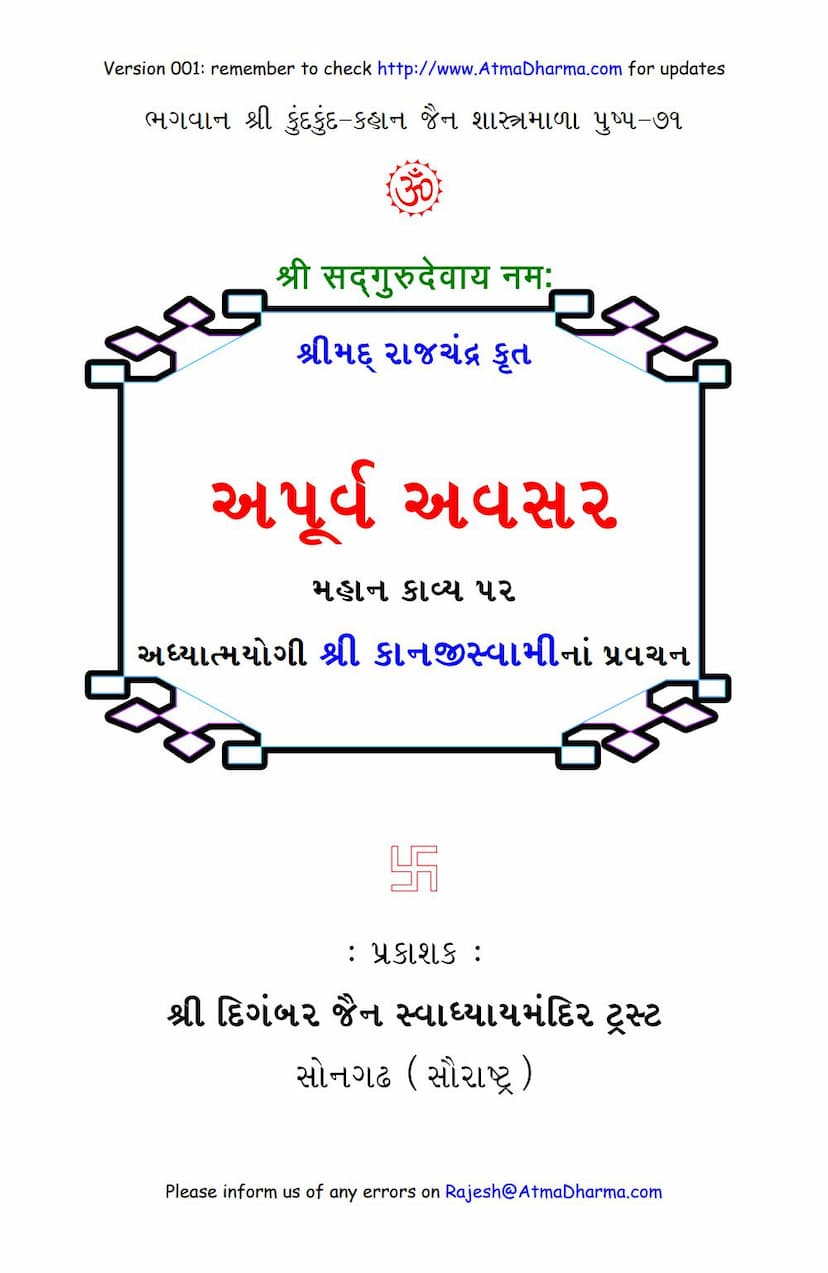Apurva Avsar Pravachan
Added to library: September 1, 2025

Summary
Here's a comprehensive summary of the Jain text "Apurva Avsar Pravachan" by Shrimad Rajchandra, interpreted by Kanjiswami:
Title: Apurva Avsar Pravachan (An Unprecedented Opportunity: Discourses)
Authors: Shrimad Rajchandra (original poem), Kanjiswami (discourses)
Publisher: Shri Digambar Jain Swadhyay Mandir Trust, Songadh (Saurashtra)
Overview:
This book is a collection of discourses by the highly revered Jain scholar and spiritual luminary, Pujya Kanjiswami, on the profound and devotional poem "Apurva Avsar Eevo Kyare Avase?" (When Will Such An Unprecedented Opportunity Arise?) composed by Shrimad Rajchandra. Shrimad Rajchandra, known for his deep spiritual insights and experiencing the state of spiritual awakening (samya-g-darshan) early in life, penned this poem expressing his intense longing for liberation and the attainment of pure, detached spiritual practice. Kanjiswami's discourses meticulously explain the intricate philosophical and spiritual concepts embedded within Shrimad Rajchandra's poem, making them accessible to a wide audience.
Key Themes and Concepts:
The discourses, and thus the poem's essence, revolve around the ultimate goal of Jainism: Moksha (liberation), achieved through Atma-anubhava (self-realization) and Vitarag-charitra (passionless conduct). Kanjiswami elaborates on Shrimad Rajchandra's expressions of:
-
Longing for the Ideal Spiritual State (Apurva Avsar): The poem's central theme is the aspiration for an "unprecedented opportunity" to attain the highest spiritual state, characterized by complete detachment, self-sufficiency, and the realization of the soul's true nature.
-
The Path of Moksha (Guṇasthāna Ārohaṇa): Shrimad Rajchandra's poem is seen as a guide through the spiritual journey, with the fourteen stages of spiritual development (Guṇasthānas) serving as steps towards the "palace of Moksha." The journey begins with Samyak-darshan (right faith or perception), the fourth Guṇasthāna, and progresses through stages of increasing purity and detachment.
-
Detachment (Nirgrantha): A significant emphasis is placed on becoming both externally and internally detached – Bahya-antar nirgrantha. This means renouncing all external possessions and worldly attachments (like family, wealth) and, more importantly, eradicating internal attachments like raag (attachment), dwesh (aversion), and kashay (passions). The ideal state is that of a Digambar Muni (naked ascetic), representing complete non-possession and liberation from all conditioning.
-
Cutting Bonds (Sarva Sambandh nu Bandhan Chhedine): The poem reflects a deep desire to sever all worldly ties and relationships. This includes not only physical relationships but also the subtler bonds of karmic attachments and the identification with the body and mind. The goal is to realize the soul's inherent state of being unbound.
-
Following the Path of the Great Souls (Mahat Purush ne Panth): Shrimad Rajchandra expresses a yearning to walk the path trodden by the omniscient beings (Tirthankaras) and great spiritual masters (Munivars). This involves emulating their conduct, their unwavering equanimity, and their deep self-realization.
-
Equanimity and Indifference (Udasinata / Samabhav): Kanjiswami highlights the importance of equanimity towards all worldly dualities – pleasure and pain, friend and foe, praise and criticism, life and death. This state of indifference is not apathy but a deep understanding of the soul's unchanging nature, transcending the transient experiences of the world. It's described as the "mother of spirituality."
-
The Nature of True Asceticism (Muni Dasha): The discourses delve into the essence of monasticism, emphasizing that it is not merely an outward change of attire but an internal transformation. True asceticism involves the complete eradication of the four passions (krodh, maan, maya, lobh), the absence of desires, and an unwavering focus on the soul's pure nature. The ideal is exemplified by the state of the omniscient beings, free from all karmic bonds.
-
The Practice of Knowledge and Conduct (Gyan and Charitra): The journey involves gaining right knowledge (samya-g-gyan) about the soul's true nature and then embodying that knowledge through right conduct (samya-g-charitra). This implies a continuous effort to purify one's internal state and align one's actions with the soul's pure essence.
-
Conquering Karmic Obstacles: The discourses explain how to overcome the impediments created by karma, particularly the Charitra Mohaniya Karma (karma related to conduct) and the subtle remaining impurities. The path involves intense spiritual effort (purushartha) and unwavering focus.
-
The Uniqueness of the Soul: A core message is the inherent purity, bliss, and omnipotence of the soul, which is likened to a jewel or a treasure trove. The spiritual practice is about uncovering this latent potential, which is not dependent on external factors but arises from within.
-
Devotion and Reverence: The discourses also touch upon the importance of devotion and reverence towards the omniscient beings (Jinas) and their teachings, seeing them as guides and exemplars on the spiritual path.
Kanjiswami's Approach:
Kanjiswami's discourse style is characterized by:
- Detailed Explanation: He meticulously breaks down each verse and concept of Shrimad Rajchandra's poem, providing in-depth philosophical and practical interpretations.
- Emphasis on Experience: While explaining the philosophy, he consistently points towards the experiential aspect of spirituality, encouraging the listeners to engage in introspection and self-observation.
- Accessibility: Despite the profoundness of the subject matter, Kanjiswami explains it in a clear, simple, and relatable manner, making it understandable for individuals from all walks of life, including children, women, and the elderly.
- Inspiration for Practice: The ultimate aim of his discourses is to inspire the listeners to earnestly pursue the path of self-realization and liberation, emphasizing that true spiritual progress comes from dedicated practice and not just theoretical knowledge.
Significance:
"Apurva Avsar Pravachan" serves as a powerful guide for spiritual seekers, offering profound insights into the Jain path to liberation. It highlights the timeless teachings of Shrimad Rajchandra and Kanjiswami's ability to illuminate these teachings for contemporary understanding and practice. The book emphasizes that the "unprecedented opportunity" is the chance to realize one's true, liberated self, an opportunity available to all who sincerely embark on the spiritual journey.